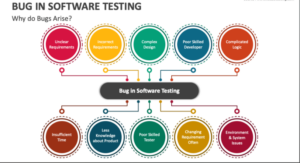SAP stands for systems, Applications and Products. The other name of online financial and administrative software. SAP is made up of individual modules which perform various organizational system tasks. The main products of SAP are SAP, ERP and SAP business objects software. SAP software consists of three tier architecture-database application server and client SAP GUI.
SAP Business suite contains five enterprise applications like SAP ERP, CRM(customer relationship management), Product Life cycle management(PLM), SCM(supply chain management), Supplier relationship management(SRM).
SAP Testing:
SAP testing is testing the functionality of these modules like ERP, CRM, PLM, SCM, SRM.
A SAP system undergoes various changes like patch management and fixes, new module implementations and various other configuration changes. SAP testing is a process of executing a transaction or system with a purpose to find errors. It is an event or activity aimed at evaluating an attributes and business capabilities of a transaction or system and determining that it meets its required results. Basically SAP testing is involved with testing SAP transactions and custom programs.
Why SAP testing is performed?
It is an important function in the growth of an organisation like
- System validation- SAP testing consists complete end-to-end testing and validation of all SAP modules in SAP ERP environment.
- Quality and Revenue- It is an output based testing and not like different conventional testing methods which are input based. It guarantees the quality of SAP testing and also focuses on revenue and cost of the organisation.
- Cost and predictability- SAP testing involves reducing the SAP development costs and improve predictability.
- Compliance Requirement- SAP testing guarantees that the SAP implementation is adapting to the new compliance requirements in a particular organisation and all the modules are working as per the expected configuration.
- Integration- SAP testing is performed to test various reports, data flows and work flows, GUI forms etc.
- Performance- It is also used to guarantee if the system will be able to meet the service level agreements time taken by the system to perform task and specific actions by the system.
SAP test scenario:
The test scenario describes as a standard end-end sales order without electing any custom code or oddball situations.
It contains many steps like:
There are transactional steps which contains the 24 steps which consist of Transaction code, Business process steps to run the data.
In step 1 – contains the actual test script with an scenario id, then security id then input is used as the data given as order type,customer , materials quantity. The expected result will be when we place order it gets a message as order is confirmed.
In step 2 – after the first test is completed in the next step validating the data is done and again this step is retested by the tester and after the final results it is passed to the next step. Likewise the test is done for all steps like checking the stock, checking the pricing, checking the persons details etc.
In the step 3 – finally testing with all the procedures by different testers order delivery is processed to the respective customers. It is tested by using different SAP testing tools.
The benefits achieved are:
- System validation
- Quality and Revenue
- Cost and predictability
- Compliance management
























12 Responses
SAP stands for systems, Applications and Products. SAP is made up of individual modules which perform various organizational system tasks. The main products of SAP are SAP, ERP and SAP business objects software. SAP software consists of three tier architecture-database application server and client SAP GUI, and it contains five enterprise applications like SAP ERP,CRM,PLM,SCM,SRM.
The benefits achieved are:
*System validation
*Quality and Revenue
*Cost and predictability
*Compliance management
SAP stands for systems, Applications and Products.SAP is made up of individual modules which perform various organizational system tasks. The main products of SAP are SAP, ERP and SAP business objects software. SAP software consists of three tier architecture-database application server and client SAP GUI.
It is an important function in the growth of an organisation like
1.System validation- SAP testing consists complete end-to-end testing and validation of all SAP modules in SAP ERP environment.
2.Quality and Revenue- It is an output based testing and not like different conventional testing methods which are input based.
3.Cost and predictability- SAP testing involves reducing the SAP development costs and improve predictability.
4.Compliance Requirement- SAP testing guarantees that the SAP implementation is adapting to the new compliance requirements in a particular organization and all the modules are working as per the expected configuration.
5.Integration- SAP testing is performed to test various reports, data flows and work flows, GUI forms etc.
6.Performance- It is also used to guarantee if the system will be able to meet the service level agreements time taken by the system to perform task and specific actions by the system.
The benefits achieved are:
1.System validation
2.Quality and Revenue
3.Cost and predictability
4.Compliance management
SAP :
The other name of online financial and administrative software is called SAP (systems, Applications and Products).
SAP is made up of individual modules which perform various organizational system tasks. The main products of SAP are SAP, ERP and SAP business objects software. SAP software consists of three tier architecture-database application server and client SAP GUI.
SAP Testing :
SAP testing is testing the functionality of these modules like SAP ERP, CRM (customer relationship management), Product Life cycle management (PLM), SCM (supply chain management), Supplier relationship management (SRM).
List below are the reasons behind SAP Testing being important function for the growth of an organization :
1. System validation – Complete end-to-end testing and validation of all SAP modules
2. Quality and Revenue – Guarantees the quality of SAP testing and also focuses on revenue and cost of the organization.
4. Compliance Requirement – Guarantees that the SAP implementation is adapting to the new compliance requirements and all the modules are working as per the expected configuration.
5. Integration – Test various reports, data flows and work flows, GUI forms etc.
6. Performance -Guarantee if the system will be able to meet the service level agreements time taken by the system to perform task and specific actions by the system.
SAP Testing:
SAP stands for systems, Applications and Products. The other name of online financial and administrative software. SAP is made up of individual modules which perform various organizational system tasks. The main products of SAP are SAP, ERP and SAP business objects software. SAP software consists of three tier architecture-database application server and client SAP GUI.
SAP Business suite contains five enterprise applications like SAP ERP, CRM(customer relationship management), Product Life cycle management(PLM), SCM(supply chain management), Supplier relationship management(SRM).SAP testing is testing the functionality of these modules like ERP, CRM, PLM, SCM, SRM.
SAP Testing is performed to accomplish the following:
1)System validation
2)Quality and Revenue
3)Cost and predictability
4)Compliance Requirement
5)Integration
6)Performance
The benefits achieved are:
1)System validation
2)Quality and Revenue
3)Cost and predictability
4)Compliance management
Thanks for sharing such an informative blog, to know more on no-code automation for SAP Testing platform, find the link below
https://www.opkey.com/sap-test-automation/
SAP stands for systems, Applications and Products. The other name of online financial and administrative software. SAP is made up of individual modules which perform various organizational system tasks. The main products of SAP are SAP, ERP and SAP business objects software. SAP software consists of three tier architecture-database application server and client SAP GUI.
SAP Business suite contains five enterprise applications like SAP ERP, CRM(customer relationship management), Product Life cycle management(PLM), SCM(supply chain management), Supplier relationship management(SRM).SAP testing is testing the functionality of these modules like ERP, CRM, PLM, SCM, SRM.
SAP Testing is performed to accomplish the following:
1)System validation
2)Quality and Revenue
3)Cost and predictability
4)Compliance Requirement
5)Integration
6)Performance
The benefits achieved are:
1)System validation
2)Quality and Revenue
3)Cost and predictability
4)Compliance management
SAP is systems, Applications and Product, made up of individual modules which perform various organizational system tasks. SAP software consists of layered architecture-database application server and client SAP GUI.
AP Testing :
SAP testing is testing the functionality of these modules like SAP ERP, CRM (customer relationship management), Product Life cycle management (PLM), SCM (supply chain management), Supplier relationship management (SRM).
List below are the reasons behind SAP Testing being important function for the growth of an organization :
1. System validation – Complete end-to-end testing and validation of all SAP modules
2. Quality and Revenue – Guarantees the quality of SAP testing and also focuses on revenue and cost of the organization.
4. Compliance Requirement – Guarantees that the SAP implementation is adapting to the new compliance requirements and all the modules are working as per the expected configuration.
5. Integration – Test various reports, data flows and work flows, GUI forms etc.
6. Performance -Guarantee if the system will be able to meet the service level agreements time taken by the system to perform task and specific actions by the system.
SAP
SAP stands for Systems Application Product. Other name of SAP is online financial and administrative product. SAP software consists of 3 tier architecture : Database Application Server and Client SAP GUI.SAP software contains 5 applications:
1. SAP ERP
2. CRM
3. PLM
4. SCM
5. SRM
SAP testing performs important functions for growth of orgnaisation
1. System Validation
2. Quality and revenue
3. Cost and predictability
4. Compliance requirement
5. Integration
6. Performance
SAP stands for Systems, Applications and Products.
SAP is made up of individual modules which perform various organizational system tasks. The main products of SAP are SAP, ERP and SAP business objects software. SAP software consists of three tier architecture-database application server and client SAP GUI.
It is an important function in the growth of an organisation like
1.System validation- SAP testing consists complete end-to-end testing and validation of all SAP modules in SAP ERP environment.
2.Quality and Revenue- It is an output based testing and not like different conventional testing methods which are input based.
3.Cost and predictability- SAP testing involves reducing the SAP development costs and improve predictability.
4.Compliance Requirement- SAP testing guarantees that the SAP implementation is adapting to the new compliance requirements in a particular organization and all the modules are working as per the expected configuration.
5.Integration- SAP testing is performed to test various reports, data flows and work flows, GUI forms etc.
6.Performance- It is also used to guarantee if the system will be able to meet the service level agreements time taken by the system to perform task and specific actions by the system.
The benefits achieved are:
1.System validation
2.Quality and Revenue
3.Cost and predictability
4.Compliance management
SAP Testing:
SAP stands for systems, Applications and Products. The other name of online financial and administrative software. SAP is made up of individual modules which perform various organizational system tasks. The main products of SAP are SAP, ERP and SAP business objects software. SAP software consists of three tier architecture-database application server and client SAP GUI.
SAP Business suite contains five enterprise applications like SAP ERP, CRM(customer relationship management), Product Life cycle management(PLM), SCM(supply chain management), Supplier relationship management(SRM).SAP testing is testing the functionality of these modules like ERP, CRM, PLM, SCM, SRM.
SAP Testing is performed to accomplish the following:
1)System validation
2)Quality and Revenue
3)Cost and predictability
4)Compliance Requirement
5)Integration
6)Performance
The benefits achieved are:
1)System validation
2)Quality and Revenue
3)Cost and predictability
4)Compliance management
SAP stands for systems, Applications and Products. The other name of online financial and administrative software. SAP is made up of individual modules which perform various organizational system tasks. The main products of SAP are SAP, ERP and SAP business objects software. SAP software consists of three tier architecture-database application server and client SAP GUI
SAP testing is testing the functionality of these modules like ERP, CRM, PLM, SCM, SRM. Basically SAP testing is involved with testing SAP transactions and custom programs.
SAP testing is performed for:
System validation- complete end-to-end testing and validation of all SAP modules in SAP ERP environment.
Quality and Revenue-output based testing which guarantees the quality of SAP testing and focuses on revenue and cost of the organization.
Cost and predictability- reduce the SAP development costs and improve predictability.
Compliance requirement- SAP implementation is adapting to new compliance requirements in particular organization and all modules are working as per the expected configuration.
Integration- tests various reports, data flows and work flows, GUI forms etc.
Performance-guarantee if the system will meet service level agreements time taken by the system to perform task and specific actions by the system.
SAP stands for systems, Applications and Products. The other name of online financial and administrative software. SAP is made up of individual modules which perform various organizational system tasks. The main products of SAP are SAP, ERP and SAP business objects software. SAP software consists of three tier architecture-database application server and client SAP GUI.
SAP Business suite contains five enterprise applications like SAP ERP, CRM(customer relationship management), Product Life cycle management(PLM), SCM(supply chain management), Supplier relationship management(SRM).
SAP testing is a process of executing a transaction or system with a purpose to find errors. It is an event or activity aimed at evaluating an attributes and business capabilities of a transaction or system and determining that it meets its required results. Basically SAP testing is involved with testing SAP transactions and custom programs
Sap is an important function in the growth of an organisation like
System validation
Quality and Revenue
Cost and predictability
Compliance Requirement
Integration
Performance